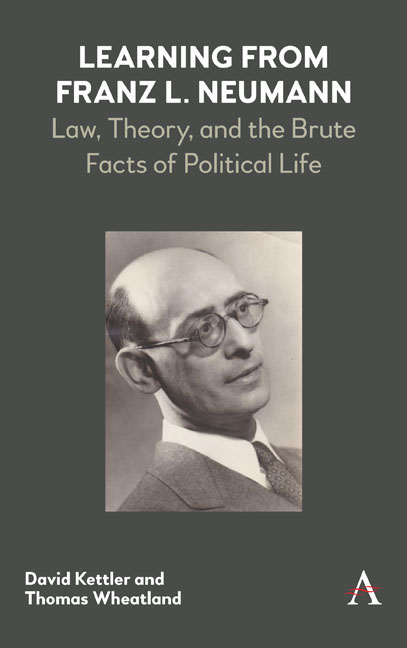Book contents
- Frontmatter
- Contents
- Chapter 1 The Challenge of Franz L. Neumann
- Chapter 2 Social Constitution, Social Power and Responsibility: Neumann and Labor Advocacy
- Chapter 3 Power, Resistance and Constitutions
- Chapter 4 Franz Neumann's Commemoration of Exile
- Chapter 5 After Weimar: The First Exile
- Chapter 6 Neumann's Second Exile: Negotiating the Politics of Research
- Chapter 7 No Happy End: Unprofitable Negotiations
- Chapter 8 Behemoth: Wars Can Be Lost
- Chapter 9 Franz Neumann in Washington: The Political Intellectual at War
- Chapter 10 Franz Neumann in the University: La guerre est finie
- Chapter 11 The Legacy: Four Studies
- Conclusion
- Index
Chapter 10 - Franz Neumann in the University: La guerre est finie
Published online by Cambridge University Press: 06 September 2019
- Frontmatter
- Contents
- Chapter 1 The Challenge of Franz L. Neumann
- Chapter 2 Social Constitution, Social Power and Responsibility: Neumann and Labor Advocacy
- Chapter 3 Power, Resistance and Constitutions
- Chapter 4 Franz Neumann's Commemoration of Exile
- Chapter 5 After Weimar: The First Exile
- Chapter 6 Neumann's Second Exile: Negotiating the Politics of Research
- Chapter 7 No Happy End: Unprofitable Negotiations
- Chapter 8 Behemoth: Wars Can Be Lost
- Chapter 9 Franz Neumann in Washington: The Political Intellectual at War
- Chapter 10 Franz Neumann in the University: La guerre est finie
- Chapter 11 The Legacy: Four Studies
- Conclusion
- Index
Summary
The author [of the book under review] drew the consequences of withdrawing from political participation. A political activist may regret this decision […] In the present situation he may, however, be right. There are historical situations where an individual, no matter how honest, intelligent and courageous, is quite powerless to affect the course of history.
Franz L. Neumann (1952)American Policy for Postwar Germany: Analysis and Advocacy
If it is the measure of political intellectuals that their professional and academic work always contained an orientation to practice in the political sphere, as noted earlier, Neumann's functioning in this capacity in the postwar years involved a narrowing of the relevant domain to the locus of political education. His practical energies and skills were primarily invested in the reshaping of political studies at Columbia University, in the non- Communist university project in Berlin, and in the institutionalized political science discipline in the United States. Underlying this aspect of his activities was his political judgment that, in the end, the raising of a generation of politically aware young people held more promise than investing in the resurrection of the labor movement. As with many matters, Neumann was close in this to his friend, Herbert Marcuse, who embodied this project in the decades after Neumann's death, albeit in a style that Neumann would never have essayed.
Like Marcuse, however, he also sought to bring his wartime experience to bear on elite discussions about American policy toward Germany and the Soviet Union. In August 1946, Neumann prepared a research proposal entitled “The Buffer Society,” whose intended recipient— presumably a funding source— is not known, although he sent a copy with his regards to Max Horkheimer. The objective he poses is to help the United States to cooperate with the United Kingdom and the Soviet Union to maintain peace, in the full sense of that term. He begins by noting the “structural differences” between the Western powers and the Soviets, schematically reviewing all the dimensions he had covered in Behemoth and by postulating that they are all of “vital importance in international relations.” Neumann observes that each of the countries “strives to create a sphere of exclusive influence in order to strengthen its security,” but that there are also a number of countries under the postwar control of some multipartite commission, with varying degrees of influence by one or the other partner.
- Type
- Chapter
- Information
- Learning from Franz L. NeumannLaw, Theory, and the Brute Facts of Political Life, pp. 369 - 430Publisher: Anthem PressPrint publication year: 2019



